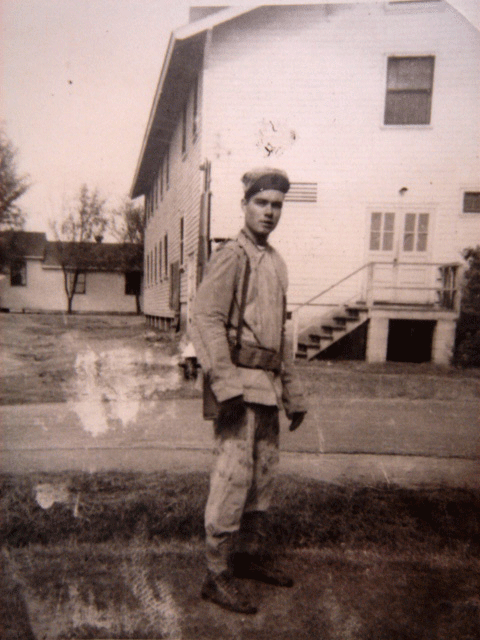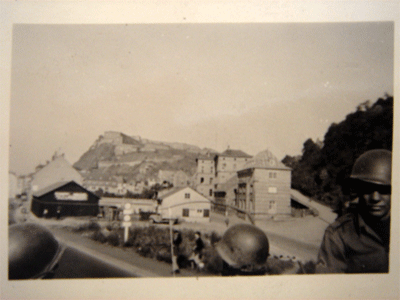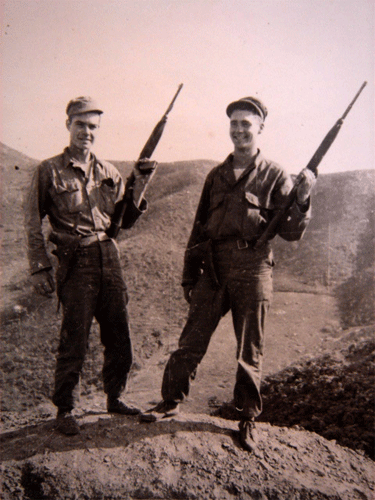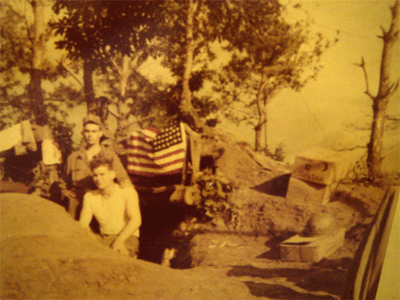May 28, 2007
Memorial Day

My father's life was framed by the Korean War. Fifty years separated a battle that wiped out 197 of 215 men and my father's eventual PTSD, in which uncontrollable flashbacks prompted his demise near the very anniversay of that massacre. I heard him speak of that day only once in my life. It was an abbreviated account.
He came to the position politically that the war was a waste and terrible and that no one in their right mind would want to bring it on. As time passed, I began to consider that he was speaking personally, that the war he experienced stole his life in some way. I told him of the large Korean community in Los Angeles, of how healthy and vibrant they are. I told him of hte satellite photos of the Korean pennisula at night, of how many generations of families have enjoyed happy lives as a result of his efforts so long ago. I was hoping that he might realize that his sacrifice had a purpose, that his pain purchased some measure of good in the world.
Tragically, I don't think he could feel where I was coming from.
I found a book that is a good dry historical account of what happened on that day, however fragmented as it is. I thought that a good way to co-memorate Memorial Day is to share the relevant bits with you after the jump...

He was stationed on Okinawa (in the 29th Infantry, Baker Company, 1st Battallion, 3rd Regimental Combat Team) when the North Koreans pushed south to the Pusan Perimeter, the small rump on the southeast end of the pennisula. Events were developing so rapidly, that we had to dump troops into a malestrom.
He was eighteen at the time.
The first reinforcements to arrive were 1/29 and 3/29 from Okinawa. The original plan was to train the two battalions in Japan for six weeks. within days, this was changed. MAJ Tony J. Raibl, XO of the 3/29 had been sent ahead to Japan, where he learned on July 20 that the two battalions of the 29th would not stop in Japan, but continue to Korea.......MAJ Raibl next was told that the battalions would have 10 days of "intensive field training" near Pusan. When he arrived in Taegu on July 22nd, Raibl had an extensive conference with GEN Walker. As a result of this meeting, the major understood that the battaliions would have three days at Pusan to draw equipment, zero and test fire weapons.
But when the two battalions unloaded at Pusan on the 24th, they were rushed to Chinju and attached to the 19th Infantry Regiment. They were allowed no time for anything. Rifles were not zeroed-in, nor crew-served weapons test fired. Some weapons test fired. Some weapons, such as the newly issued .50 cal machine gus were still in cosmoline. The perilous tactical situation on the southern front virtually dictated that these two commands be rushed there at once, otherwise the decision to rusht he 29th to combat in this fashion would have been criminal. As it was, both commands suffered crippling losses in their first battles.

Possibly contributing to troubles of both battalions was the fact that both of their commanders were new to their commands, and neither had combat experience. LTC Wesley Wilson (West Point 1929) , then 43, commanded the 1st battalion, LTC Harold W. Mott commanded the 3rd.My father curtly described the combat as that which happened in waves, of being mired in struggles in which anything in reach was used as a weapon. Knives and pistols and M-1 carbines spent and used as clubs, bodies stacked between assaults to form defensive positions. Ultimately, there were no words to describe the mayhem.On the afernoon of July 25th, the two commands arrived at Chinju. That evening, 3/29 was ordered to take Hadong, a road junction town 35 miles southwest of Chinju.

His commanding officer was LT John Hughes, a tree trunk of a man, whose character was oak. My father's abbreviated description of that time was an image of Hughes crawling down a hill; eyes wild, knife in one hand and a pistol in the other. My dad said "I made eye contact with LT Hughes and pointed to the Korean interpreter..." knowing that he was the key to find an exit from the slaughter, "...and I made maximum effort to get to him and cross the river." the only alternative out of the kill zone.
In all, LT Hughes had 215 men in his B/29th... was initially deployed on high ground west of Annui. The enemy attacked with superior forces from three sides, putting the Americans in desperate battle from the beginning. By nightfall on july 27, Co. B had been forced back into the town. Hughes planned to high ground across the Nam River east of town. Two officers and 16 (enilsted men) got across the river before enemy machine gun fire cut off the rest of the unit. These 18 men tried to help the others break out, finally, giving up and making their way through the hills to the 34th near Kochang.I don't know how long they were out in the countryside, escape and evasion, but it was over a week. He drew vignettes of stealing food from villages at night, approaching the sentry position at the perimeter of friendly forces with shouts of vulgarities to authenticate that they were Americans. He said that the food and shower there was the best he ever had.Posted by Dennis at May 28, 2007 8:48 PM

Leave a comment